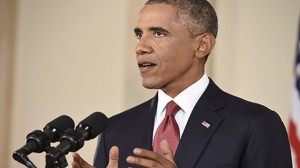 WASHINGTON, United States, Monday January 4, 2016 – In a move that would have been unthinkable at the start of his presidency, Barack Obama may well mark his final year in office with a historic trip to communist Cuba, which has been under a US trade embargo for more than 50 years.
WASHINGTON, United States, Monday January 4, 2016 – In a move that would have been unthinkable at the start of his presidency, Barack Obama may well mark his final year in office with a historic trip to communist Cuba, which has been under a US trade embargo for more than 50 years.
The trip would be more likely to materialize if Havana bolstered its human rights record and opened its doors more fully to American business in the coming weeks, a senior advisor to the president said on Saturday.
“The key test,” said deputy national security advisor Ben Rhodes, is “whether the president’s going to Cuba would help advance those priorities,” and in particular, whether a visit would “improve the lives of the Cuban people.”
Rhodes was speaking to reporters in Honolulu hours before Obama was due to fly back to Washington from a two-week family vacation in his childhood home state of Hawaii.
The controversial possibility arose as part of a preview of the president’s foreign policy plans for his final year in office, as aides prepared for his return to the White House.
The Los Angeles Times reports that the overarching foreign policy challenge of the New Year will be the fight against the terrorist organization Islamic State and its efforts to inspire attacks against Western targets.
Yet while Rhodes ranked the campaign against Islamic State first in every mention of Obama’s foreign policy priorities, he also made clear that the president planned a full-court press on several projects — all of them crucial to his foreign policy legacy.
The normalization of relations with Havana is said to be of symbolic significance to the Obama administration.
According to the LA Times, it represents not only a historic opportunity to end a lingering remnant of the Cold War, but also the chance to push for an affirmative change rather than simply respond to crises in the Middle East.
The initiative is not without its detractors. Many believe that Cuban President Raul Castro will not significantly expand the freedoms of his people and that Obama will go down in history for doing business with a despotic regime.
Rhodes, a lead negotiator in the talks between Washington and Havana, said he believed the Castro government had its own reasons to open the way for commerce and to free the flow of information via Internet and cellular communications.
“I think they have made a decision that they want this to happen,” said Rhodes, adding that there are changes afoot in Cuba and that the government sees “some degree of change” as “consistent with their revolution.”
President Obama’s hope is reportedly to make enough progress in US-Cuban relations — with more travel to and corporate investment in the island nation — that a Republican successor could not undo his work.
Obama will go to Cuba, Rhodes said, when and if his team determines a visit would advance that cause.
“On the Cuban side, there are steps they could take over the course of the year that could allow them to absorb greater economic activity,” Rhodes was quoted as saying by Bloomberg. “Nobody expects Cuba in the next year to become a multi-party democracy,” he added.
The US and Cuba started to re-establish ties in late 2014. Obama and Cuban President Raul Castro met at the Summit of the Americas in Panama in April 2015, the first meeting between US and Cuban heads of state since 1961.
